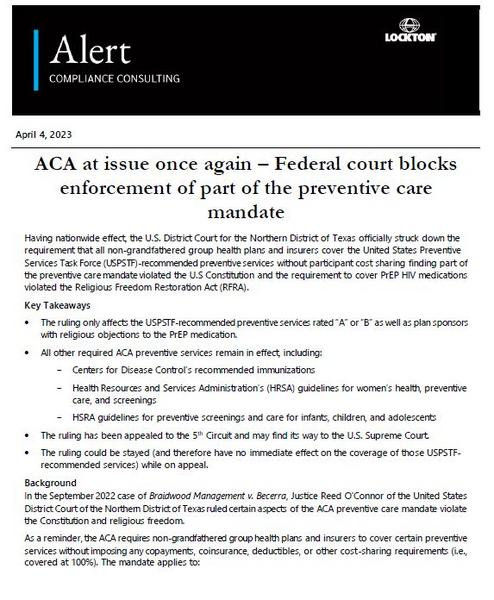Having nationwide effect, the U.S. District Court for the Northern District of Texas officially vacated the requirement that all group health plans and non-grandfathered insurers cover preventive services recommended by the Task Force on The United States Preventive Services Act (USPSTF) without participants sharing the costs determining the requirement for coverage related to these specific services violated the U.S. Constitution and the requirement to cover HIV PrEP medications violated the U.S. Preventive Services Act (USPSTF). Restoration of Religious Freedom (RFRA).
-
The decision only affects prevention services recommended by the USPSTF and rated “A” or “B,” as well as plan sponsors with religious objections to the drug PrEP.
-
All other required ACA preventative services remain in effect, including:
-
Vaccinations recommended by the Centers for Disease Control.
-
Health Resources and Services Administration (HRSA) guidelines for women’s health, preventive care, and screenings.
-
HSRA Guidelines for Preventive Screenings and Care of Infants, Children, and Adolescents.
-
-
The decision has been appealed to the 5th Circuit and could go to the U.S. Supreme Court.
-
The decision may be stayed (and therefore have no immediate effect on coverage of USPSTF-recommended services) while the appeal is pending.
In the case of September 2022 of Braidwood Management v. BecerraJudge Reed O’Connor of the United States District Court for the Northern District of Texas ruled that certain aspects of the ACA’s preventive care mandate violated the Constitution and religious liberty.
As a reminder, the ACA requires group health plans and non-grandfathered insurers to cover certain preventive services without imposing copayments, coinsurance, deductibles, or other cost-sharing requirements (i.e. -say 100% covered). The mandate applies to:
-
USPSTF recommended preventative services rated “A” or “B”.
-
The Centers for Disease Control and Prevention’s Advisory Committee on Immunization Practices (ACIP) has recommended vaccinations.
-
Preventative care and screenings for women are provided in the HRSA guidelines; And
-
Preventive screenings and care for infants, children, and adolescents are provided in the HSRA guidelines.
Judge O’Connor concluded that the preventive care recommendations made by the USPSTF, which become binding under the ACA to the extent that covered preventive care is subject to the first-dollar coverage rule, violate the Appointments Clause of the U.S. Constitution, because the USPSTF is a volunteer group not appointed by the president. or confirmed by the Senate. O’Connor went on to find that requiring employers to cover PrEP, an HIV medication regimen that is considered an ACA preventive service, violates RFRA.
Lockton’s comment: Judge O’Connor’s decision upheld parts of the ACA’s preventive care mandate, including the HRSA’s recommendations for women, children, and adolescents and the ACIP’s recommendations, meaning that Recommendations from these organizations would still be covered by non-grandfathered plans and insurers. without any cost sharing requirements.
At the time of the decision, no appeal had been offered. Instead, the Court asked both parties to provide additional information on an appeal. And now here we are.
This week, Judge O’Connor issued a nationwide injunction blocking enforcement of applicable provisions of the ACA’s preemptive mandate found unconstitutional in his September ruling, specifically the USPSTF recommendations rated “A » or “B” as of March 23, 2010. and coverage of PrEP medications against HIV.
Keep in mind the injunction does not impact preventive care recommendations made by HRSA or ACIP, meaning that these preventive care services must still be covered in accordance with ACA requirements.
The Biden administration quickly appealed the decision.
The injunction will likely not have an immediate impact on employers with fully insured plans because these policies are state-approved and the terms of the state-approved policy are likely locked in until the period of next renewal. Additionally, these fully insured policies may be subject to certain state preventative care mandate requirements.
For employers with self-insured group health plans, the injunction would allow employers to amend their plans to make changes, including implementing cost sharing for preventive care services recommended by the USPSTF affected by the decision.
Lockton’s comment: As a practical matter, employers may not be willing to make mid-year changes to their benefit plans, which may address employees’ questions and concerns regarding preventative care coverage. Additionally, if the decision is overturned on appeal and/or the Administration requests a stay of the decision pending appeal, the plan may need to be modified again.
It is also unclear how quickly carriers and third-party administrators can update their claims processing systems to change the list of preventive services and apply cost sharing to services to which the injunction applies while still covering remaining preventive care requirements without cost sharing. in accordance with the ACA mandate.
Employers who choose to change their plans mid-year will be required to provide advance notice of these changes prior to the effective date, 60 days in advance to be exact, since preventive care cost-sharing information are reflected in the conditions of a plan. Summary of Benefits and Coverage (opens a new window). Employers who choose to make changes based on the start of the new plan year may communicate these changes as part of annual open enrollment.
Lockton’s comment: Questions are being asked about the decision’s impact on health savings accounts (HSAs). Specifically, if an employer continues to provide USPSTF-recommended preventive services without cost sharing, will this first-dollar coverage of USPSTF-recommended preventive services render individuals ineligible to contribute to an HSA. Entities are already contacting the Treasury Department and the IRS to encourage flexibility with HSAs and to request confirmation that services recommended by the USPSTF are still considered preventive care under the HSA rules, which have traditionally been more broader in their definition of preventive care than the ACA. , allowing first-dollar coverage without impacting participants’ HSA eligibility.
In summary, this question is far from being resolved since the appeals are ongoing. If you have any questions or clarification, please contact your Lockton account team. Download the article (opens a new window)
Download the article (opens a new window)
